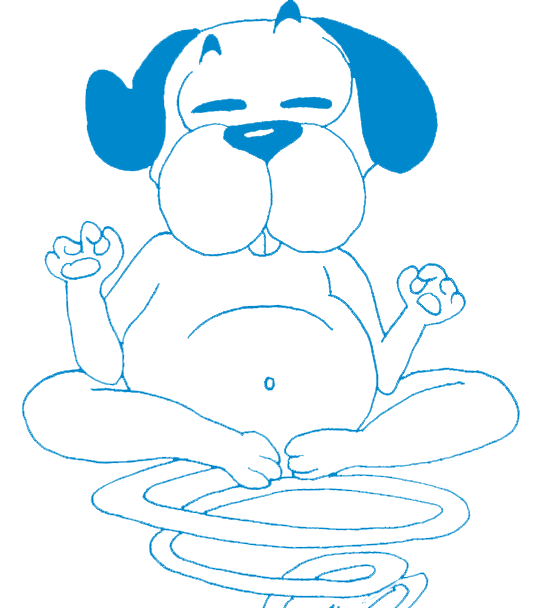What is it?
How do we suggest that our dogs use their nose to find tasty things to eat? The search for food being part of the basic survival reflexes, all dogs have this innate talent. This activity can be proposed from once to 4 times a day.
What do we need?
Treats that our dog likes, in small pieces or as a paste.
Description and progression
Step 1: 5 treats scattered, where the dog can see them, over a small area. To make the exercise easier for dogs in difficulty, we can start in a quiet room of the house (where he feels comfortable).
Step 2: More treats, always within sight of the dog, over a larger area.
Step 3: Many treats, while the dog is not watching, over the same area. It is important to add only one difficulty at a time: either the number of treats, or the surface area, or the environment (calm, noisy, distracting,…), or in or out of the dog’s sight. Only one parameter changes between two stages of the exercise.
Stage 4: Many treats, again within sight of the dog, on the same surface, in the garden for those who offered the exercise at home or during a walk (in an open area) for those who already used the garden. When a new parameter causes great difficulty (change of environment for example), the level of difficulty of one of the other parameters can be reduced (again while watching, for example).
![]() Video: Treat search on the deck
Video: Treat search on the deck
![]() Video: Treat search in the grass
Video: Treat search in the grass
![]() Video: Treat search in the grass – Diana and Finot
Video: Treat search in the grass – Diana and Finot
Step 5: We continue to offer increasingly difficult searches, changing only one parameter at a time. The weather can also help us to diversify environments.
Step 6: After working on the ground, we can tackle working at heights. We place cream cheese or pâté (a slightly sticky food that is easy to spread) on a border, a pole, a clothes line, window boxes,…
Learning without pressure
It is possible that our dog may take a break: he simply leaves the search area and goes off to other activities or simply goes to rest. There is no need to insist and make him continue the exercise. If we force our dog, it is no longer a game but it becomes an obligation which will not necessarily leave him with a good memory.
Scent work requires a lot of concentration. Beginners need time to develop their abilities as they go along. And let’s not forget that learning takes place optimally when the dog is not stressed and therefore not put under pressure.
In the same vein, there is no need to “motivate” our dog by repeating the request (“search” for example). While our dog is focused on each of the treats to be found, he mainly uses his sight and sense of smell. Repetitions of “search”, “search”, “search” distract him and overwhelm his ears and brain with unnecessary information. This is only distraction, not motivation.
It is unnecessary to help them, for example, by pointing to the treats you see. The game is for our dogs to develop their olfactory skills, it is not a game of speed or performance. When our dog stops searching, the game is over, either temporarily because a few moments of rest will be enough for him, or permanently depending on our dog. Let’s respect his learning pace.
Let’s also respect his recovery pace: a busy weekend induces a greater need for rest. The ideal is then to offer our dog an easier search game: a few treats scattered around the house or on the lawn will do the trick.
Those who do not cope
If our dog is not interested in this game, a question arises: does he like the treats we offer him? It is up to us to offer him treats that live up to his expectations.
If our dog likes these treats but he is not interested in searching, it is probably because it is too difficult for him (physically if our dog is old, sick or injured / emotionally if our dog is not at ease in the environment for example / if we have skipped steps in the learning progression). It is up to us to offer him a game that matches his physical and/or emotional abilities.
Some dogs do not like to share their food. It is imperative to offer these dogs the opportunity to do so alone. It is up to us to offer a game adapted to the social abilities of our dog.
TAKEAWAY
- All dogs have this talent;
- Choose treats which are appreciated by your dog;
- It can be organized from once a day to four times a day;
- Increase the difficulty level, step by step;
- No pressure;
- Choose games which are adapted to the needs, expectations and abilities of our dog.

